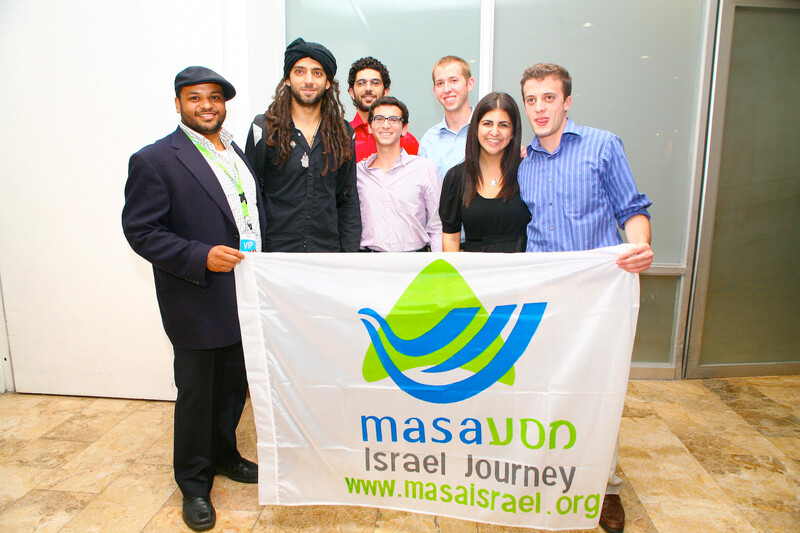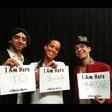The Electronic Intifada New York City 28 October 2011

Idan Raichel (second from left) has performed for the opening night of MASA Israel tours, an Israeli government project which brings young Jews to Israel.
Flickr“We certainly see ourselves as ambassadors of Israel in the world, cultural ambassadors, hasbara ambassadors, also in regards to the political conflict.” - Idan Raichel, 2008 (“An interview with Idan Raichel,” translated from Hebrew in online magazine To Australia).
On Tuesday, 18 October, I and eight other Adalah-NY members stood in front of the Beacon Theatre in Manhattan, holding signs, singing songs, and handing flyers to passersby and concert-goers. The concert: Grammy Award-winning singer/songwriter India.Arie, and “Israel’s most popular dread-locked musician” (according to the Israeli Ministry of Foreign Affairs), Idan Raichel.
Despite one India.Arie fan’s claim that “I’m sure she doesn’t even know who the other performer is tonight; that’s how concerts get planned,” the show was actually part of a larger tour the two musicians have planned together to promote their joint album “Open Door.”
“Does ‘Open Door’ include Palestinians?” asked one of our signs, while another demanded, “Don’t entertain apartheid.”
“Idan Raichel can’t support apartheid,” countered one concert-goer. “He sleeps with a black woman!”
While this claim is as laughable as it is offensive, the more prevalent objection to cultural boycott actions is the idea that culture and politics are somehow separate. But as long as the Israeli government uses art and culture to cover up Israeli war crimes, culture and politics are clearly intertwined.
As is evident in Idan Raichel’s quotation above, the musician is willingly part of the Brand Israel campaign, which aims to bring arts to the world in order to, in the words of an Israeli foreign ministry official, “show Israel’s prettier face, so we are not thought of purely in the context of war” (“After Gaza, Israel grapples with crisis of isolation,” The New York Times, 18 March 2009).
The moral case for cultural boycotts
Adalah-NY stated in a recent press release that beyond Raichel’s collusion with the Israeli government’s cynical use of art, he has served in and performed for the Israeli army and actively expressed support for the Israel military during its brutal attacks on Gaza in the winter of 2008-09 and criticized Israelis who refused to serve in the army.
Raichel’s performance in 2007 in the Israeli settlement Nokdim led to a call for boycott by the Israeli organization Gush Shalom for collaborating with settlements that prevent any possibility of peace (“New Yorkers protest India.Arie concert with Israeli superstar Idan Raichel,” 18 October 2011).
In 2004, the Palestinian Campaign for the Academic and Cultural Boycott of Israel (PACBI) called on global civil society to boycott Israeli cultural institutions, products, and events that normalize Israel’s multi-layered system of oppression against Palestinian people. Many international artists have heeded the call and have refused to perform in Israel, including Elvis Costello, Gil Scott-Heron, Devendra Banhart and The Pixies.
Cultural boycott actions can be fairly simple, and provide an opportunity for people to work together nationally. Our friends in Seattle alerted us and their friends in Olympia to Raichel’s tour and sent us the flyer they would be using on the tour’s opening night. We revised the flyer for a New York audience and sent it to our friends in Burlington and Boston. With minimal effort, we had coordinated a five-city protest action.
The moral case for cultural boycott should be clear, yet there are still some who question it on tactical grounds. Why focus on cultural boycott, they ask, when it is arguably the hardest case to make to a non-politically minded public? Over and over again, I have found cultural boycott actions to yield some of the richest dialogue I have seen about Palestine.
Holding peace-loving, liberal-seeming artists and audiences accountable
People who attend cultural events, particularly peace-loving liberal-seeming concerts such as India.Arie and Idan Raichel, are often quite receptive to arguments about social justice. They do not want to be accused of supporting racism, and they do not want to cross a picket line.
On 18 October, some people merely read our signs and moved on. Some questioned the connection between Raichel and the government. Some thanked us for being there. Some sneered and tore our flyers in half. One person took extra flyers to pass out inside. One debated whether to give up her $200 ticket, and then decided instead to yell “Free Palestine” during the show.
People engage in different ways, but they engage. They are pushed beyond their comfort zones. They begin to question, or, in the case of committed Zionists, they are at least reminded that they cannot get away with using culture to whitewash apartheid.
Shifting the discourse
Perhaps the most important gain of the cultural boycott in the United States so far has been the way in which it has shifted the discourse about Palestine. One of our first cultural boycott actions in New York was a small protest of the Batsheva Dance Company, who we discovered with very little notice was to perform at the Brooklyn Academy of Music in March 2009.
The show happened to coincide with Israeli Apartheid Week, the annual week of actions around the world to bring attention to Israeli apartheid policy and to support the growing boycott, divestment and sanctions (BDS) movement, so we brought people together to sing, chant and distribute flyers.
Our press release garnered media attention, and a number of articles were written which questioned the tactic of cultural boycott. In so doing, however, these articles took for granted the idea that Israel can be called an apartheid state that should be protested against, and even at times boycotted. It was simply the cultural boycott that was being questioned. We had successfully shifted the discourse and opened an important conversation within the mainstream media.
Israel is desperate to salvage its global image and promote itself as a liberal democracy, but it is not working. As Idan Raichel and India.Arie continue their “Open Door” tour, people with conscience the world over are heeding the Palestinian civil society call for BDS. Cultural boycott actions highlight cultural workers’ complicity in Israel’s violations of international law and human rights, thereby opening the door to justice a little wider each day.
Hannah Mermelstein is a Palestine solidarity activist working with Adalah-NY and a school librarian based in Brooklyn, NY.





Comments
'Cultural' boycott?
Permalink John Brooks replied on
I think the words 'art' and 'culture' are strained beyond recognition when they are applied to a marketing construct like 'Idan Raichel.'
I can understand there being some debate over whether it's helpful to boycott someone like author David Grossman, who is not wholly uncritical of Israeli colonialism and racism, but Idan? He is an 'artist' in the same way 'Ronald McDonald' is an 'actor.'
This article also raises another important question: who is "Israel’s LEAST popular dread-locked musician?”